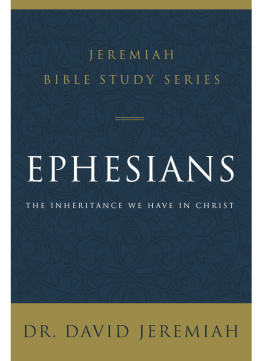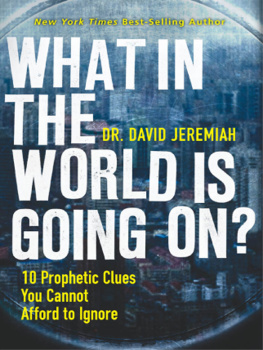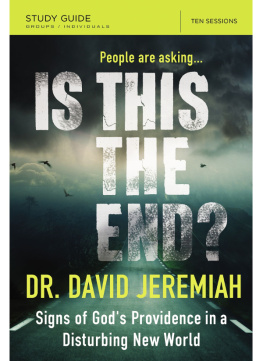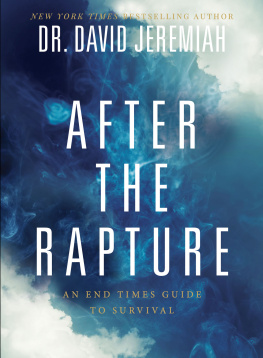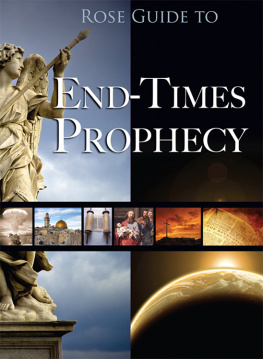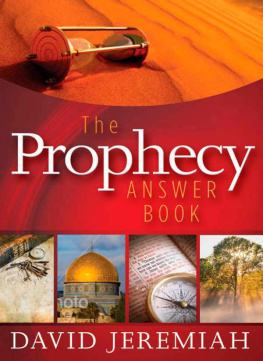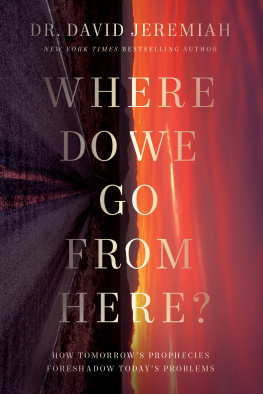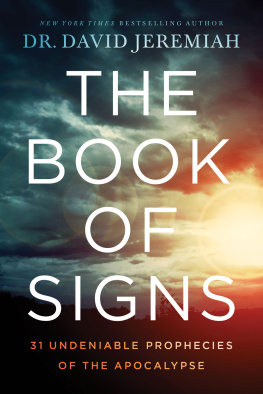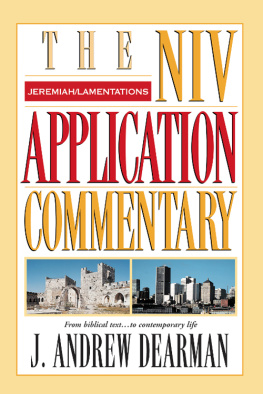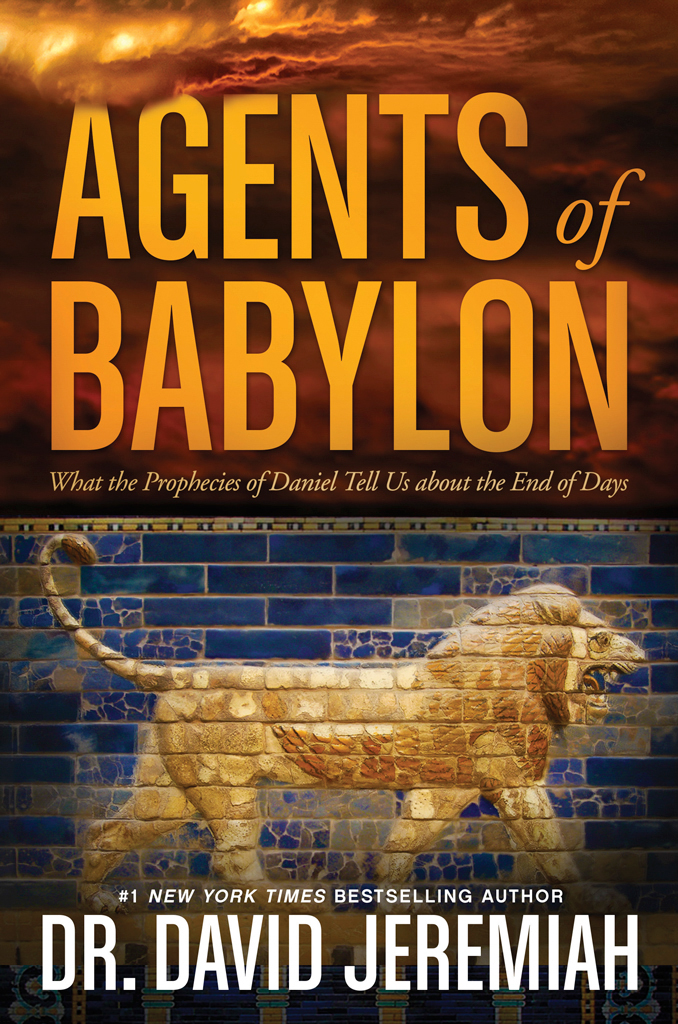Visit Tyndale online at www.tyndale.com.
TYNDALE and Tyndales quill logo are registered trademarks of Tyndale House Publishers, Inc.
Agents of Babylon: What the Prophecies of Daniel Tell Us about the End of Days
Copyright 2015 by David Jeremiah. All rights reserved.
Cover photographs are the property of their respective copyright holders and all rights are reserved: sky SJ Allen/Shutterstock; storm Minerva Studio/Dollar Photo Club; Ishtar gate and faade by Marcus Cyron, used under Creative Commons Attribution license; lion by Maria Giulia Tolotti, used under Creative Commons Attribution license.
Designed by Jennifer Ghionzoli
Edited by Stephanie Rische
Published in association with Yates & Yates (www.yates2.com).
All Scripture quotations, unless otherwise indicated, are taken from the New King James Version, copyright 1982 by Thomas Nelson, Inc. Used by permission. All rights reserved.
Scripture quotations marked NLT are taken from the Holy Bible, New Living Translation, copyright 1996, 2004, 2015 by Tyndale House Foundation. Used by permission of Tyndale House Publishers, Inc., Carol Stream, Illinois 60188. All rights reserved.
Scripture quotations marked ESV are taken from The Holy Bible, English Standard Version (ESV), copyright 2001 by Crossway, a publishing ministry of Good News Publishers. Used by permission. All rights reserved.
Scripture quotations marked GNT are taken from the Good News Translation in Todays English Version, Second Edition, copyright 1992 by American Bible Society. Used by permission.
Library of Congress Cataloging-in-Publication Data
Jeremiah, David, date.
Agents of Babylon : what the prophecies of Daniel tell us about the end of days / Dr. David Jeremiah.
pages cm
Includes bibliographical references.
ISBN 978-1-4143-8052-0 (hc)
1. Bible. Daniel Prophecies. 2. Bible. Daniel Criticism, interpretation, etc. I. Title.
BS1556.J465 2015
224'.5015 dc23 2015026384
ISBN 978-1-4964-1123-5 (International Trade Paper Edition)
Build: 2016-03-21 12:06:24
To the members and friends of Shadow Mountain Community Church, whom I have had the honor of serving for thirty-four years
Introduction
WHY A BOOK ABOUT BABYLON?
I N 1859, C HARLES D ICKENS wrote his famous novel A Tale of Two Cities, which was set in late eighteenth-century Paris and London. This was the time of the French Revolution, when the streets of Paris ran with blood spilled in the countrys reign of terror.
The Bible could also be termed a tale of two cities: Jerusalem and Babylon. Jerusalem, of course, is the historical capital of Gods chosen nation, Israel, and the future capital of His eternal Kingdom. Babylon, on the other hand, is the city the Bible uses as a recurring symbol for the worlds evils decadence, cruelty, abuse of power, and especially rebellion against God.
Babylon began as Babel, the city established by the ambitious Nimrod in his attempt to organize the first worldwide government in opposition to God (Genesis 11:1-9). Centuries later, it was the armies of Babylon that conquered Jerusalem and the city of Babylon that held the exiled Jews captive.
Babylon fell more than five centuries before Christ, but its spirit survived in subsequent world empires, including Rome, the society that executed Christ and persecuted the first Christians. Despite its strength, the Roman Empire eventually fell. We know from biblical prophecy, however, that it will revive in the end times. But as Revelation makes clear, its spirit will be that of Babylon, because it will continue what Nimrod began humankinds attempt to usurp the authority of God.
The other city, Jerusalem, has fallen several times and has been occupied or oppressed throughout much of history. It might seem, therefore, that Babylon, the city of man, has been stronger than Jerusalem, the city of God. But thats not the case. Yes, Jerusalem has been persecuted, but for a good reason: its persecution has been a form of discipline designed to prepare it for its future role. The book of Revelation makes it clear that in the history-long struggle between these two cities, Jerusalem will be the ultimate victor. Revelation tells of Babylons final destruction and the ascendancy of Jerusalem as the permanent capital of Gods eternal Kingdom.
The natural question, then, is why I would choose to write a book about an evil city that will eventually suffer an eternally crushing defeat. The answer is that we are living in a time marked by the spirit of Babylon, and we know from biblical prophecy that this force will continue to rise until it dominates the entire world. I wrote this book to help us prepare for that time, which I am convinced is close at hand.
* * *
BABYLON FROM THE INSIDE
Nowhere in the Bible do we get a clearer picture of the nature of Babylon than in the book of Daniel. The book bears the name of its author, one of the prominent exiles forced to march to Babylon when King Nebuchadnezzar conquered Jerusalem almost six centuries before Christ. A study of Daniel is relevant because it portrays a period of history that is much like the culture we find ourselves in today. The first half of the book gives us a picture of the kind of people we must be to remain strong in the face of the future God reveals in the last half of the book.
I have chosen to focus this study of the book of Daniel on the personality portraits it presents to us. These are the agents of Babylon. In Daniel we meet two kinds of human agents. First, we see people of prayer and firm conviction who know who God is and refuse to compromise their faith by giving in to the demands of a corrupt and godless culture. Second, we see people who are filled with pride, given to debauchery, and have no respect for any god but their own glory and appetites. Most important, we meet the Agent of agents the Most High God, who exercises His sovereign control at every twist and turn of the story.
As we encounter these agents, we will explore the prophetic visions described in the book of Daniel. These visions show us two futures. The first is a future that had not yet occurred when Daniel wrote of it but has now been explicitly fulfilled in history. Its the story of four world empires that have risen and fallen exactly as Daniel predicted. The second future is one that is yet to come a dark and foreboding future describing what we call the end times, which will occur before the glory of Christ fills the world forever. The explicit accuracy of the prophecies that have been fulfilled gives us absolute confidence in those that are yet to be fulfilled.
Both of these phases of Daniels prophecy have immense value to us today. They bring to light the cyclical nature of history and project it into the future to show us how we must live in the present so we can prepare for the time yet to come. In fact, the entire book of Daniel both the personal portraits and the prophecies demonstrates why the courage, conviction, and devotion to prayer portrayed by Daniel are as critical today as they were in his time.
Daniel himself lived in a time of rampant godlessness in an empire that wallowed in opulence, debauchery, arrogance, blasphemy, and pleasure an empire that brought devastation to Gods people. Those with the discernment to read the signs of the times today (Matthew 16:2-3) recognize that the similarities between Daniels Babylon and todays Western culture are signs that Daniels dark prophetic visions loom close on the horizon. The only way to endure is to rely on Gods strength, as Daniel did, and commit ourselves to standing up for principles of righteousness.


